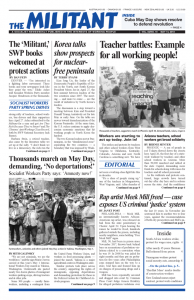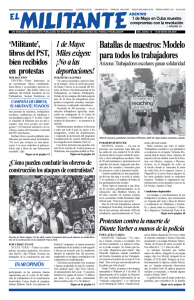After five days of protests by tens of thousands of students, workers and others across the country, Nicaraguan President Daniel Ortega revoked his April 16 directive to raise social security payroll taxes and cut benefits.
But even after the reversal of the anti-working-class measures protests continued, condemning the killing of some 40 participants in previous actions. Protest leaders say most were killed by the police or by pro-government thugs. Two police were killed during the clashes. Ortega also deployed soldiers around government buildings and shut down five television stations for reporting on the protests.
On April 23, the day after Ortega reversed the directive, tens of thousands joined a Managua protest initiated by COSEP, the main organization of capitalist business owners, calling for an end to violence and the initiation of a “dialogue.” This time the police and thugs stayed away. The government has agreed to the dialogue.
Dozens of stores and commercial centers — including a dozen of Walmart’s 100 Nicaragua locations — were looted during the protests. Ortega and Vice President Rosario Murillo, who is also his wife, seized on the looting to claim protesters were being manipulated by criminals and opposition political parties.
“We have to re-establish order,” Ortega said. “We cannot allow groups to impose chaos, crime and looting.” Murillo blamed the protesters for the violence. “Encouraging, stimulating, provoking, disturbing tranquility,” she said, “is a sin.”
Fall of the Nicaraguan Revolution
Ortega and Murillo lead the Sandinista National Liberation Front (FSLN), but this has little but the name in common with the party that led workers and peasants in Nicaragua in July 1979 to overthrow the U.S. backed-dictatorship of Anastasio Somoza.
Along with the revolution in Grenada earlier that year, Fidel Castro said in 1980, there were now “three giants rising up to defend their independence, sovereignty, and justice, on the very threshold of imperialism.”
Worried that the example could inspire others in Latin America and around the world, Washington organized counterrevolutionary groups that waged an eight-year contra war that left 30,000 dead and sabotaged economic development.
The Nicaraguan people defeated the contras. But instead of using that victory to organize workers and peasants to move forward, to take more control of production and to give more land to the peasants, the FSLN leadership rejected following the example of the Cuban Revolution. Instead of deepening the revolution, the FSLN abandoned its historic program. Ortega and the other leaders transformed the organization into a bourgeois electoral party, increasingly divorced from the interests of workers and farmers.
This course led to the party losing the 1990 presidential election to Violeta Chamorro, a recognition that the revolution was no more.
Ortega’s alliance with capitalists
In 2006, Ortega won the presidential election, but not based on a program to advance the interests of working people. He then forged an alliance with COSEP and with the hierarchy of the Catholic Church, both of which had opposed every advance of the Sandinista revolution after Somoza’s overthrow.
Ortega was re-elected in 2011 and again in 2016, this time with Murillo as his vice president.
The attack on social security was first proposed by the International Monetary Fund, which had been collaborating with the Ortega government for years to improve conditions for local and foreign capitalists. The government has recently increased sales taxes and cut subsidies for electricity.
The attacks on protesters by police and FSLN-organized thugs ignited simmering anger at government policies that favor the bosses at the expense of the working class, attempts to censor the press and social media and widespread corruption.
“The social security move was the drop of water that made the glass overflow,” Javier Calero, a software technician in Managua, told the Militant by phone April 27. “Every month prices are going up 5 or 10 percent, but our wages aren’t going up.”
Carrying Nicaraguan flags and handmade signs against the attack on social security, protesters sang the national hymn, and shouted, “Free homeland or death,” a slogan that was popular during the revolution.
“The big problem here is that the whole political class is discredited,” Calero said. “There is not a single political party that has people’s confidence.”
The newly formed April 19 Student Movement has called for the firing of all police commanders responsible for the attacks on the demonstrations, for freedom of speech, for a revamped electoral council, for early elections and for a “state of law.”

